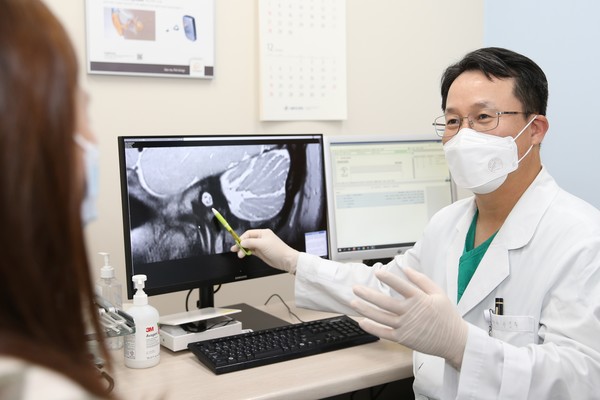A research team at Asan Medical Center (ASM) has confirmed that it is possible to predict the outcome of cochlear implant surgery by confirming the preservation of the auditory nerve with magnetic resonance imaging (MRI).

The team, led by Professor Park Hong-ju of the Department of Otolaryngology, analyzed the auditory nerve through an MRI scan on 83 adult patients with hearing loss who underwent cochlear implant surgery, the hospital said on Thursday.
The researchers found that the thicker the auditory nerve, the better the surgical result.
Also, the researchers confirmed that improvement of speech recognition ability was about 28 percent higher when the tail part of the auditory nerve was well preserved in a spiral shape. The auditory nerve has two parts -- the vestibular nerve and the cochlear nerve – which rotates about 2.5 turns along the cochlea.
The vestibular nerve is a collection of nerves that sense the sense of balance. The cochlear nerve converts the vibrations sensed by the auditory cells of the cochlea into electrical signals and transmits them to the cerebrum. There are many cases in which hearing aids that amplify sounds to make them sound louder are not effective enough for patients suffering from hearing loss due to these auditory nerve disorders.
In such cases, hospitals implants a cochlear implant, a device that acts on behalf of damaged or lost auditory nerve cells by directly providing electrical stimulation to the auditory nerve, according to AMC.
However, recent advances in imaging technology have made it possible to observe the shape of the auditory nerve in patients with hearing loss in detail through a high-resolution MRI machine, it said.
The researchers expect that the addition of high-resolution MRI image information will make it possible to predict results more scientifically based on the thickness and preservation of the auditory nerve.
“Through this study, the researchers could confirm for the first time that the spiral shape of the auditory nerve is an important imaging index that determines the outcome of a cochlear implant surgery,” Professor Park said. “Our team hopes the study will help ease psychological burdens on patients by informing them of the expected surgical effects of cochlear implantation surgery.”
As a recent study confirmed that the cerebral cortex plays an important role in the outcome of cochlear implant surgery, the team also expects that their study will help predict the outcome with much higher accuracy, Park added.

